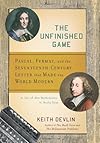

Carregue numa fotografia para ir para os Livros Google.
|
A carregar... The unfinished game : Pascal, Fermat, and the seventeenth-century letter that made the world modern (original 2008; edição 2008)por Keith J. Devlin
Informação Sobre a ObraThe Unfinished Game: Pascal, Fermat, and the Seventeenth-Century Letter that Made the World Modern por Keith Devlin (2008)
 Nenhum(a) Ainda não há conversas na Discussão sobre este livro.   ) )In 1654, Blaise Pascal, the precocious son of a French tax collector sent Pierre de Fermat a letter with a proposed solution to an old but still lingering problem. The problem goes thusly: Suppose two people are playing consecutive rounds of a game of chance. There is an agreed upon number of rounds a player has to win in order to take the pot. For each round, they each pay into the pot equally. At some point in the game, they are interrupted and the pot has to be divided. Without knowing the current “score”, how do you divide the pot fairly? This was known as “the problem of the points” in Pascal’s day. The exchange of letters between Pascal and Fermat started the development of mathematics into the realm of probabilities and applied statistics. Keith Devlin’s Unfinished Game uses these letters as a springboard to showcase the history of applied statistics. From John Graunt to the Bernoulli family to Gauss and Bayes, he explores the implications of the letters’ solutions. Interestingly enough, no one had thought to use mathematics to make prediction about human population or games of chance before. The book is succinctly written, and can easily be knocked out in an afternoon. There’s a bit of jumping around in history, and Devlin tries competently to weave together the threads of discovery. There are some digressions, however, that he gets carried away with (most notably, the bit about DNA and prosecutorial fallacies), but overall, the book does a decent job of explaining statistical history. It’s hard to fathom that a single set of letters marked the starting point of both the modern insurance racket and mathematical epidemiology. http://lifelongdewey.wordpress.com/2012/04/13/519-the-unfinished-game-by-keith-d... Overall, this book is a disappointment. I was expecting a more scholarly study of the impact of the Pascal-Fermat correspondence. This book is a nontechnical explication of applications of probability concepts in “everyday life”, with a focus on the historical development of those concepts, beginning (more or less) with the Pascal-Fermat correspondence on the solution to the problem of the just division of the pot in an unfinished game of chance. The words “risk management” are used several times, but the author reveals no insight here. Perhaps the most useful aspect of the book is in how the author distinguishes a priori and a posteriori probabilities, prior and posterior probabilities, and (flavors of) subjective and objective probabilities. La riflessione parte dal problema del gioco incompiuto: se una partita a dadi viene interrotta prima che uno dei due giocatori vinca, come va suddivisa la posta? Ripercorrendo la corrispondenza tra Pascal e Fermat si ricostruiscono le tappe che storicamente portarono alla nascita della teoria della probabilità. sem críticas | adicionar uma crítica
In the early seventeenth century, the outcome of something as simple as a dice roll was consigned to the realm of unknowable chance. Mathematicians largely agreed that it was impossible to predict the probability of an occurrence. Then, in 1654, Blaise Pascal wrote to Pierre de Fermat explaining that he had discovered how to calculate risk. The two collaborated to develop what is now known as probability theory--a concept that allows us to think rationally about decisions and events. In The Unfinished Game, Keith Devlin masterfully chronicles Pascal and Fermat's mathematical breakthrough, connecting a centuries-old discovery with its remarkable impact on the modern world. Não foram encontradas descrições de bibliotecas. |
Current DiscussionsNenhum(a)Capas populares
 Google Books — A carregar... Google Books — A carregar...GénerosSistema Decimal de Melvil (DDC)519.2Natural sciences and mathematics Mathematics Applied Mathematics, Probabilities ProbabilitiesClassificação da Biblioteca do Congresso dos EUA (LCC)AvaliaçãoMédia: (3.2) (3.2)
É você?Torne-se num Autor LibraryThing. |
||||||||||||||||||||||||||||||||||||||||||||||||||||||||||||||||||||||||||||||||||||||||||||||||||||||||||||||||||||||||||||||||||||||